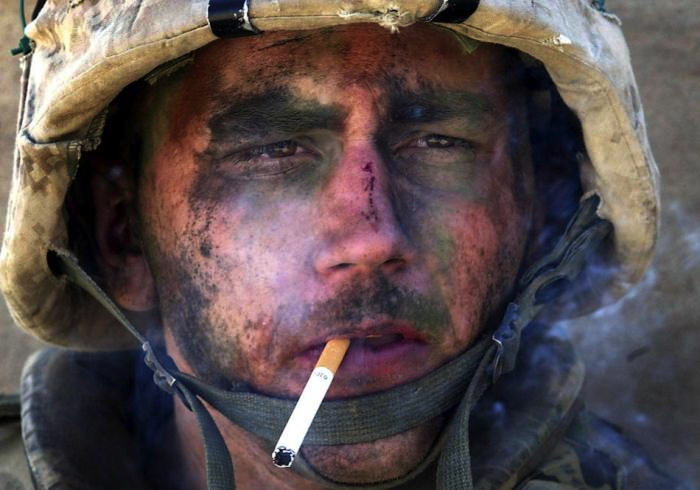 Lance Cpl. James Blake Miller, the Marlboro Marine
Lance Cpl. James Blake Miller, the Marlboro Marine
We are losing a war in Iraq and Syria, the military is shrinking dangerously as global threats are growing, and yet the Pentagon is mustering its forces against tobacco products.
The Department of Defense is studying a ban on the sale of cigarettes, cigars and chewing tobacco on bases and ships. Without committing himself, Secretary of Defense Chuck Hagel has spoken favorably of the idea, citing health-care costs: "I think we owe it to our people."
So, we can't figure out how to degrade and destroy ISIS, as repeatedly promised by the commander in chief, but just maybe we can figure out how to defeat Marlboro and Copenhagen. This would make a lot of sense -- if Michael Bloomberg were the grand strategist of the United States.
The military life frequently involves the kinds of situations that lend themselves to smoking, namely mind-numbing boredom and incredible stress, sometimes one after another, so it has long been associated with smoking.
There were national pushes to provide cigarettes to the troops in World War I and World War II. Gen. John Pershing said cigarettes were as important as bullets. The heavily stubbled, bone-weary GIs depicted in the iconic Bill Mauldin cartoons often have cigarettes drooping from their lips. Up until 1975, cigarettes were included in military rations.
During the battle of Fallujah, Lance Cpl. James Blake Miller became known as the Marlboro Marine when a picture of him, grimy and bloodied, with a cigarette dangling from his mouth, ran in 150 newspapers and magazines.
The Los Angeles Times photographer who took the picture later wrote of the terrors of that battle and how when the world was exploding around them, "Everybody dragged deeply on cigarettes."
(The photo was so instantly popular that the Marines offered to yank Miller off the front line so he wouldn't get hurt; Miller refused, and has suffered terribly from post-traumatic stress disorder.)
Of course, cigarettes aren't good for you. But if they are a significant health risk, so is signing up to risk life and limb for your country. Rep. Duncan Hunter, a California Republican and Marine reservist who has rallied congressional opposition to the ban, puts it this way: "We sleep in the dirt for this country. We get shot at for this country. But we can't have a cigarette if we want to for this country, because that's unhealthy."
A prohibition on tobacco sales would be a step toward denying members of the military access to consumer products that are freely available to the general population. No one tries to stop the black-turtleneck-wearing graduate student studying Baudelaire from buying a pack of cigarettes, but the Marine whose rifle is his best friend is another story.
What sense is there in that? And does it not occur to the prohibitionists that if cigarettes aren't sold on base, an enterprising soldier or sailor might buy them from the local 7-Eleven?
The U.S. military is the baddest killing machine that the world has ever known. It also is an enormous federal bureaucracy subject to the same asinine, politically trendy imperatives of any other federal bureaucracy.
Certainly, in terms of sheer health, it would be better if every member of the military ate lots of kale and other leafy greens, had a glass of red wine over dinner and never touched a cigarette. Soldiers and sailors might have other ideas about what they want to consume, though. They have signed up for an inherently regimented life, but -- as people in whom we entrust life-and-death responsibility -- they deserve the leeway to decide for themselves whether they want to light up or not.
If they can fight ISIS, battle the Taliban, brave Ebola and respond to natural disasters around the world -- and do it well and without complaint -- surely they can handle the threat of having cigarettes sold in close proximity to them.
Comment by clicking here.



 Contact The Editor
Contact The Editor
 Articles By This Author
Articles By This Author